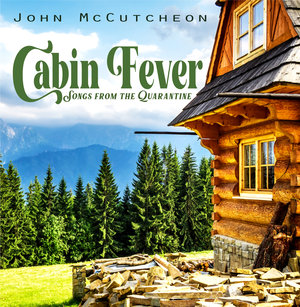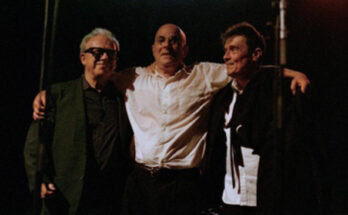John McCutcheon returned from his Australian tour in mid-March and immediately went into self-imposed quarantine as a precaution for his family. Hermitted away at his north Georgia cabin, he read and wrote and tried to use his time creatively. He had long phone conversations with old friends and took long walks trying to imagine the changes that loomed ahead. Then he started writing songs, lots of them – a new one every day for three weeks. “I was in a groove so deep you could lose a tractor in it!” he mused.
The result of those three weeks is a new album, Cabin Fever: Songs from the Quarantine. What almost overshadows this remarkable output is the fact that this is McCutcheon’s 41st album in 45 years. As prolific as this Georgia-based singer-songwriter is, what is equally astonishing is the consistent quality and variety of the songs.

The collection opens with “Front Line,” an homage to emergency care workers, told from the perspective of one of these individuals. “The Night That John Prine Died” is a spontaneous, loving tribute to McCutcheon’s friend who famously passed away in early April from COVID-19. “Sheltered in Place” is sung by a homeless man at an exit ramp with his cardboard sign, claiming that he’s known that kind of isolation for years.
From humorous (“My Dog Talking Blues”) to tender (“One Hundred Years”), to rollicking (“Hallelujah Morning”) to sideways (“Earth”), the barebones performances recorded simply with guitar or piano are vocally and instrumentally stellar, the production pristine, and the settings intimate and engaging.
“This is not the album I’d planned to do this year!” protests McCutcheon. Following his last release, To Everyone In All the World: a Celebration of Pete Seeger, in honor of the folk icon’s 100th birthday, he had stockpiled over 30 new songs as a pool for a new album of McCutcheon originals. “But that pesky virus kind of put a kink in the notion of gathering a bunch of my pals and going into a windowless recording studio for days on end. I mean I love these folks, but…”
So the new album was put on hold, McCutcheon went into self-quarantine and out poured Cabin Fever. He returned from his mountain retreat and began recording in his home studio. He sent the tracks up to his long-time engineer and co-producer Bob Dawson at Bias Studios in Springfield, VA for mixing and mastering. And less than two months after the first song was penned, the entire project was done.
“It’s an album that is completely of its time. That is, the subject matter, while not exclusively about COVID-19 and its effects, came out of that milieu. It was recorded in total isolation, mixed in isolation, my graphic designer worked on her part after she put her kids to bed, a remarkably quick turn-around time, and, to top it all off, it’s a pay-what-you-can release.”
Realizing many people are out of work now, McCutcheon wanted to make the album affordable for anyone. “It’s a new model: even broke people need music…maybe more than most, so they can have it for free, no questions asked. And, on the other end, we’re hoping that those folks who are a little better off might pay a little more. That kind of generosity, too, is really of this time.”
In a career that has spanned nearly fifty years, McCutcheon has frequently been on the cutting edge of change in the folk music world. He is credited as one of the major forces in the revival of the hammer dulcimer. His 1983 album Howjadoo is widely cited as the beginning of the revolution in high-quality children’s music in the US. He helped found and, for a decade and a half, lead the first non-geographic local union, the American Federation of Musicians. His song “Christmas in the Trenches” was named one of the “100 Essential Folksongs” by Folk Alley. His work in both children’s books and a one-man play are further evidence of why the Washington Post dubbed him “folk music’s rustic renaissance man!”
Most recently, he’s been producing weekly live-streaming concerts via Facebook Live on a variety of themes, with a host of special guests from professional baseball players, to international union presidents, to musicians from around the globe. “It’s a whole new world we’re both creating and knitting together. But those of us in small business…and folk music is nothing if not small business!…have always had to be flexible, resilient, and creative. I love exploring new ways to reach people.”
In that context, Cabin Fever: Songs from the Quarantine almost seems inevitable. A writer with a keen and empathic eye, breathing songs into the world around him. It’s vintage folk music. It’s vintage John McCutcheon.


